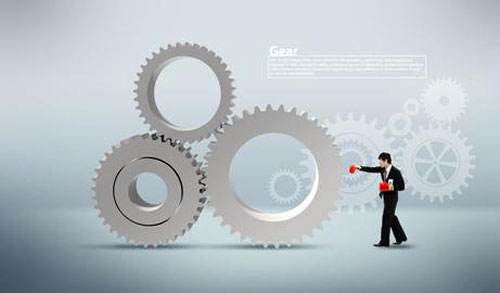
当前课程知识点:History of Western Civilization 全英文西方文明史 > Chapter 4 Ancient Roman Civilization 2 > 4.4 The Victory of Christianity > 4.4.1 Text
返回《History of Western Civilization 全英文西方文明史》慕课在线视频课程列表
4.4 The Victory of Christianity
Hi, this is the fourth part of the fourth chapter, The Victory of Christianity.
1.Theodosius,also known as Theodosius the Great was Roman Emperor from 379 to 395. He was the last emperor to rule over both the eastern and the western Empire. After his death, his two sons inherited the east and west parts respectively. The Roman Empire was never re-united until the fall of the western Empire in 476. During Theodosius’s reign, Christianity became the official religion of the Roman Empire. Geek and Roman temples were converted into Christian churches; the Temple of Apollo in Delphi was shut down. The last Ancient Olympic Games was held in 393, after that it was banned.
From the early first century, Christians had been persecuted for nearly 300 years, but now they started to persecute others. Theodosius banned all paganism, paganism is a term used by the early Christians for the Romans who practiced polytheism, the worship of more than one god. Christianity is monotheism, believing there is only one God, Greek and Roman religions are polytheism.
2. In 390 some rioters murdered the Roman governor in the Greek city of Thessalonica. Theodosius ordered the killing of 7,000 people there. This massacre angered the bishop of Milan Ambrose who excommunicated the emperor from his church. Excommunicate is to officially announce a person is no longer a member of the church. After several months,finally the emperor was forgiven until he did public penance for his brutal act. Penance is a form of apology for sin or wrong doing. From this incident,we can see the church sometime was even more powerful than the emperor. Let’s look at this picture; the bishop is stop the emperor going into the church.
3. Basic knowledge of Christianity
Jesus and the early Christians were Jewish people, Christianity grew out of Judaism and finally Split from it. When Christianity became the official religion of the Roman Empire, most of Jewish people still believe Judaism like today. Christianity emerged in the mid-1st century in the Roman Empire province of Judea. By the end of the 4th century it became the official state religion of the Roman Empire. Today it is the world's largest religion, with over 2.4 billion Christians, 1/3 of the global population. Christianity played a very important role in the development of the Western civilization, thus it is necessary to learn the basic knowledge of Christianity.
The Bible is the holy book of Christianity. The first part is the Old Testament, based on the Hebrew Bible. The second is the New Testament, written in the common Greek language, deals with the life and teachings of Jesus Christ as well as events in the first-century Christianity.
4. The Book of Genesis is the first book of the Old Testament. Genesis is about the beginning of the world. God creates the world in six days and rested in the seventh day. He creates the first human Adam out of "the dust of the ground" and the first woman Eve form Adam’s rib. Adam and Eve and all the animals lived peacefully in the Garden of Eden. Adam and Eve were tempted by a talking serpent to eat the forbidden fruit from the tree of knowledge of good and evil. They became ashamed of their nakedness and God expelled them from the Garden. This is the fall of man. Adam and Eve’s disobedience to God is the original sin of human being. God punished Adam to getting what he needs only by sweat and work, and Eve to giving birth in pain.
5. This is the painting, the fall in the Sistine Chapel by Michelangelo.
6. Adam and Eve’s descendants lived on the earth for ten generations. Seeing the earth was filled with violence, God decided to destroy his creation, he told Noah to build an ark in which Noah’ family together with a male and a female of all living creatures would be saved. The flood lasted for one year and 11 days. On the last day, the dove sent by Noah returned with an olive leaf. So,Noah knew the flood is over. Noah died 350 years after the flood, at the age of 950.
7. Abraham
At God's command Noah's descendant Abraham led his people migrated from his home in Mesopotamia into the land of Canaan. Canaan was an ancient region between the Jordan River and the Mediterranean, corresponding roughly to today’s Palestine and Israel. Christians believed Canaan is the Promised Land given by God to the Israelites. Abraham’s grandson Jacob's name was changed to Israel, thus his decedents were called Israelites, also called Hebrews or Jews.
8. This is the map of Abraham’s journey.
9. Moses and Exodus
Israelites migrated to Egypt and there they were enslaved. The Egyptian Pharaoh was worried that they might be a threat and ordered all newborn Hebrew boys to be killed. Pharaoh is king of Egypt. Moses was successfully hidden by his mother. God made Moses a prophet and ordered him to lead Jewish people out of Egypt. This journey back to Canaan is called Exodus. They crossed the Red Sea and reached Mount Sinai, where Moses received the Ten Commandments from the God, also called Yahweh. Ten Commandments are orders of God: to worship only God, to honor one's parents, and to keep the Sabbath, to prohibit murder, adultery, theft and dishonesty. The Sabbath is the day of not working. The Jewish Sabbath is on Saturday and the Christian Sabbath is on Sunday. This is the Statue of Moses by Michelangelo.
10. Kingdom of Israel 1050-930BC
According to the Old Testament, Saul was the first king of the Kingdom of Israel. Saul’s son David and grandson Solomon brought the Kingdom to its peak of power. When Solomon died, the country split into two kingdoms: the Kingdom of Israel in the north and the Kingdom of Judah containing Jerusalem in the south. This is the statue of David by Michelangelo.
11. When David was a young boy, he defeated a large Philistine warrior named Goliath using his weapon of sling. David hurls a stone from his sling and hits Goliath in the center of his forehead, Goliath falls on his face to the ground, and David cuts off his head, like in this painting.
12. Jesus Christ c. 4 BC – c. AD 30 / 33
The Kingdoms of Israel and Judah had been conquered by Babylonian, Persian and finally in the first century became the Roman province of Judea. Jewish revolts against Romans had been put down. The Jewish were waiting the arrival of a Messiah, a liberator who would destroy the Romans and rebuild the Kingdom of David. Jesus of Nazareth or Jesus Christ was believed to be the incarnation of God the Son and the awaited Messiah. Jesus was miraculously conceived by the Holy Spirit in Mary's womb when she was still a virgin. According to the bible, when Mary and his husband Joseph arrived in the city of Bethlehem the inn had no room and so they were offered a stable where the Child Christ was soon born.
13. Jesus was a preacher and a miracle worker. He preached a message of peace and love of God and neighbor and the imminent coming of the kingdom of Israel. Although his preaching was peaceful, he was arrested and the Roman procurator Pontius Pilate decided the Jesus posed a threat to the law and order and finally Jesus was put to death by crucifixion. And this painting is called Descent from the Cross, by Rubens.
14. This is the famous painting Last Supper by Leonardo da Vinci. We can see Jesus and his Twelve Apostles, also known as the Twelve Disciples. Judas betrayed Jesus. You can see Judas is wearing green and blue and is in the shadow, He is holding a small bag, perhaps signifying the silver given to him by payment to betray Jesus, and he looked panic and turned down the saltcellar. Since the Middle Ages, Judas has been seen as the personification of the Jewish people and his betrayal has been used to justify Christian persecution of Jews. We can’t forget the Holocaust, in Geek meaning whole burnt offering. There were 6 million European Jews murdered by Nazi Germany.
15. After the death of Jesus came the resurrection, Jesus Christ coming back to life after he had been killed. Inspired by the resurrection, Jesus’s Apostles started to spread the Gospels to Asia Minor, Greece and even Rome. Gospel in Greek means "good news". There were four books called gospels in the New Testament, they told the life, death, resurrection of Jesus. Saint Paul and Saint Peter played very important role of the spreading of Christianity. Saint Paul was born c. 5 AD and died maybe 64, maybe 67, also known as Paul the Apostle although he was not one of the Twelve Apostles. He taught the gospels of the Christ to the first century world. Paul saw Christianity was not only for Jewish people but for the whole world. He took advantage of his status as both a Jew and a Roman citizen to preach to both Jewish and Roman audiences. Saint Peter born ca. 1 and died between 64 to 68, was one of the Twelve Apostles of Jesus Christ, also known as Simon. He was a leader of the early Christian Great Church. Peter was crucified in Rome under Emperor Nero. He was crucified upside down at his own request, since he saw himself unworthy to be crucified in the same way as Jesus Christ. He is traditionally counted as the first Bishop of Rome or pope.
16.Let’s look at the key words: Adam and Eve, Moses and Exodus, Jesus Christ, resurrection,Gospels.
This is the end of fourth part of the fourth chapter, The Victory of Christianity.
返回《History of Western Civilization 全英文西方文明史》慕课在线视频列表
-1.0 Introduction
--1.0.3 Exercises
-1.1 Greek Bronze Age and Dark Age
--1.1.3 Exercises
-1.2 Greek Gods
--1.2.3 Exercises
-1.3 Archaic Greece
--1.3.3 Exercises
-1.4 Athens and the Persian Wars
--1.4.3 Exercises
-1.5 Discussion
-2.1 War and politics in the fifth century BC
--2.1.3 Exercises
-2.2 Greece in the fourth century BC
--2.2.3 Exercises
-2.3 Classical Greek Philosophy
--2.3.3 Exercises
-2.4 Athenian Drama
--2.4.3 Exercises
-2.5 Alexander the Great and Hellenistic World
--2.5.3 Exercises
-2.6 Discussion
-3.1 Roman Kingdom
--3.1.3 Exercises
-3.2 Early Republic
--3.2.3 Exercises
-3.3 Mid-Republic
--3.3.3 Exercises
-3.4 Late-Republic
--3.4.3 Exercises
-3.5 End of the Republic
--3.5.3 Exercises
-3.6 Discussion
-4.1 Pax Romana 1
--4.1.3 Excecises
-4.2 Pax Romana 2
--4.2.3 Excecises
-4.3 Crisis of the Third Century and Constantine
--4.3.3 Excecises
-4.4 The Victory of Christianity
--4.4.3 Exercises
-4.5 The Fall of the Roman Empire
--4.5.3 Exercises
-4.6 Discussion
-5.1 Early Middle Ages
--5.1.3 Excecises
-5.2 Carolingian Dynasty
--5.2.3 Excecises
-5.3 High Middle Ages
--5.3.3 Excecises
-5.4 Late Middle Ages 1
--5.4.1 Excecises
-5.5 Late Middle Ages 2
--5.5.3 Excecises
-5.6 Discussion
-6.1 The Renaissance
--6.1.3 Exercises
-6.2 Protestant Reformation
--6.2.3 Exercises
-6.3 Italian Wars and Rise of Russia
--6.3.3 Exercises
-6.4 Age of Discovery
--6.4.3 Exercises
-6.5 French War of Religion and Russia’s Time of Trouble
--6.5.3 Exercises
-6.6 Discussion
-7.1 The Thirty Years War
--7.1.3 Exercises
-7.2 English Revolution
--7.2.3 Exercises
-7.3 Three Absolute Monarchs
--7.3.3 Exercises
-7.4 Dutch Golden Age
--7.4.3 Exercises
-7.5 Science and Culture in the 17th Century
--7.5 Text
--7.5.3 Exercises
-7.6 Discussion
-8.1 The United Kingdom
--8.1.3 Exercises
-8.2 The American Revolution
--8.2.3 Exercises
-8.3 The French Revolution
--8.3.3 Exercises
-8.4 Age of Enlightenment
--8.4.3 Exercises
-8.5 West after the 18th century
--8.5.3 Exercises
-8.6 Discussion

